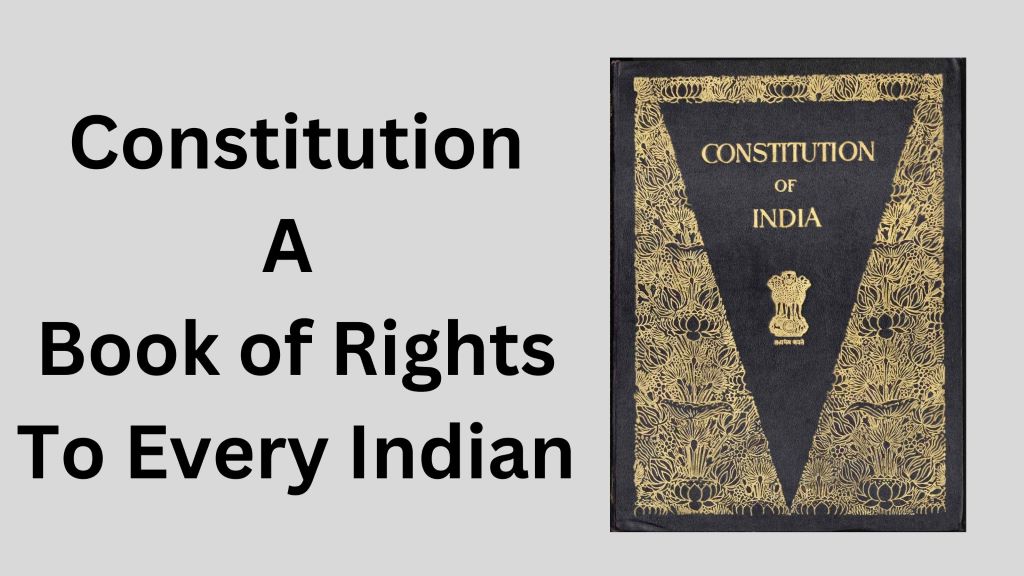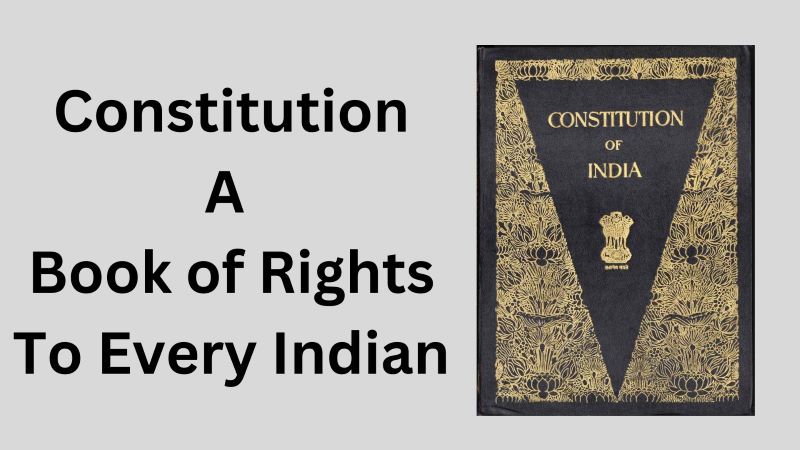Introduction: The Constitution of India stands as the cornerstone of our nation, embodying the collective aspirations, values, and principles that guide our democracy. It is not merely a legal document but a reflection of our identity, providing the framework for governance, rights, and duties of citizens. In a diverse and dynamic country like India, understanding the Constitution is not just a matter of legal obligation but a crucial step towards active citizenship and societal progress. Here’s why every Indian must make it a priority to read and comprehend the Constitution of India:

- Understanding Rights and Responsibilities: The Constitution guarantees fundamental rights to every citizen, including the right to equality, freedom of speech and expression, right to life, and many more. By familiarizing themselves with these rights, citizens become aware of their entitlements and can effectively exercise them. Moreover, the Constitution also outlines the duties of citizens towards the nation, emphasizing the importance of contributing positively to society. Knowing both rights and responsibilities fosters a sense of civic duty and encourages active participation in the democratic process.
- Safeguarding Democracy: In a democratic system, the Constitution serves as a bulwark against authoritarianism and ensures the separation of powers among the executive, legislative, and judicial branches of government. By acquainting themselves with the principles of democracy enshrined in the Constitution, citizens can hold their elected representatives accountable and actively engage in the democratic process. A well-informed citizenry is essential for the functioning of a vibrant democracy, and reading the Constitution equips individuals with the knowledge necessary to safeguard democratic values.
- Promoting Social Justice and Equality: One of the guiding principles of the Constitution is to secure social, economic, and political justice for all citizens. It envisions an inclusive society where every individual, irrespective of caste, creed, gender, or religion, enjoys equal opportunities and rights. By familiarizing themselves with the provisions related to social justice and equality, citizens can identify instances of discrimination or injustice and work towards building a more equitable society. The Constitution serves as a beacon of hope for marginalized communities, offering them protection against discrimination and exploitation.
- Nurturing a Sense of Unity in Diversity: India is a land of diversity, encompassing various languages, cultures, religions, and traditions. The Constitution celebrates this diversity while also fostering a sense of unity among its citizens. By reading the Constitution, individuals gain an understanding of the principles of secularism, federalism, and pluralism that form the bedrock of our nation. It promotes respect for different identities and encourages dialogue and cooperation among diverse communities. In a country as heterogeneous as India, the Constitution plays a crucial role in promoting national integration and harmony.
- Empowering Citizens to Effect Change: The Constitution not only outlines the structure of the government but also provides mechanisms for citizens to participate in the decision-making process. Through avenues such as elections, petitions, and advocacy, citizens can voice their concerns and influence policy decisions. By understanding the provisions related to governance and participation, individuals can become effective agents of change in their communities. Reading the Constitution empowers citizens with the knowledge and tools necessary to advocate for reforms and address pressing issues facing the nation.
Conclusion: The Constitution of India is not merely a legal document but a living testament to the aspirations and ideals of a nation. It embodies the collective wisdom of the framers who envisioned a just, inclusive, and democratic society. By reading and understanding the Constitution, every Indian can become an informed and engaged citizen, actively contributing to the nation’s progress and upholding its democratic values. In a rapidly changing world, the Constitution remains a steadfast guide, reminding us of our rights, responsibilities, and the enduring principles that bind us together as a nation. Therefore, every Indian must make it a priority to read and internalize the Constitution of India.
Top 5 powers of constitution to every Indian
The Constitution of India confers several powers upon its citizens, ensuring their rights, protections, and opportunities within the framework of the nation. Here are five significant powers that the Constitution grants to every Indian:
- Fundamental Rights: The Constitution guarantees several fundamental rights to Indian citizens, including the right to equality, freedom of speech and expression, right to life and personal liberty, freedom of religion, cultural and educational rights, and the right to constitutional remedies. These rights empower citizens to live with dignity, equality, and freedom, irrespective of their background. They serve as a safeguard against discrimination, oppression, and arbitrary actions by the state, ensuring that every individual enjoys essential liberties and protections.
- Right to Equality Before Law: The Constitution ensures that all citizens are equal before the law and prohibits discrimination on grounds of religion, race, caste, sex, or place of birth. This principle of equality ensures fairness and justice in society, promoting inclusivity and social harmony. It empowers citizens to challenge unjust practices, demand equal treatment, and access opportunities based on merit, rather than arbitrary factors. The right to equality is foundational to a democratic and egalitarian society, fostering a culture of respect and dignity for all individuals.
- Directive Principles of State Policy: The Constitution includes Directive Principles of State Policy, which provide guidelines for the government to promote the welfare of the people and establish a just and equitable society. While not legally enforceable, these principles serve as moral imperatives for the state to strive towards. They encompass various socio-economic objectives, such as providing adequate healthcare, education, and employment opportunities, ensuring social justice, and protecting the environment. Citizens can hold the government accountable for fulfilling these principles, advocating for policies that prioritize the welfare of the people and uplift marginalized communities.
- Right to Information: The Constitution empowers citizens with the right to information, enabling them to access government records and information pertaining to public authorities. This right promotes transparency, accountability, and good governance by allowing citizens to scrutinize government actions, monitor public expenditure, and hold officials accountable for their decisions. Through the Right to Information Act, citizens can seek information on matters of public importance, participate in decision-making processes, and combat corruption and inefficiency in the administration.
- Right to Constitutional Remedies: The Constitution provides citizens with the right to constitutional remedies, allowing them to enforce their fundamental rights through legal recourse. This power enables individuals to approach the judiciary for the protection of their rights and seek redressal against violations by the state or private entities. The availability of constitutional remedies, including writs like habeas corpus, mandamus, prohibition, certiorari, and quo warranto, ensures that citizens have effective means to challenge unconstitutional actions and seek justice in cases of infringement of their rights.
In conclusion, the Constitution of India bestows upon its citizens significant powers and protections that are essential for the functioning of a democratic and inclusive society. These powers empower individuals to assert their rights, participate in governance, and hold institutions accountable, thereby contributing to the advancement of democracy, justice, and equality in the nation.



